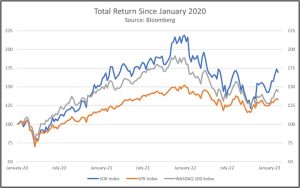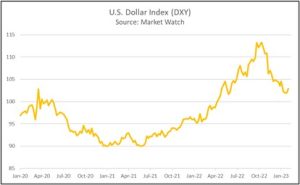Daily Comment (February 16, 2023)
by Patrick Fearon-Hernandez, CFA, and Thomas Wash
[Posted: 9:30 AM EST] | PDF
Good morning! Today’s Comment begins with a discussion about the possibility of a soft landing for the economy. Next, we review how the battle for semiconductors is causing friction within the U.S.-led bloc. Lastly, we give our thoughts on the recent rally in the U.S. dollar.
Soft Landing? Better-than-expected economic data in January has led to optimism that the Fed may be able to end its hiking cycle before a recession happens.
- January was full of positive economic surprises. The employment payroll numbers nearly tripled consensus estimates. Homebuilders’ confidence surged to a four-month high. Retail sales receipts rose and blew past expectations, and manufacturing output jumped by the largest amount in nearly a year. The strong data helped bolster claims that a recession may be further away than the markets realize and suggests that the Fed may have more time to continue raising rates. As a result, the S&P 500 closed 0.3% higher on Wednesday after trailing most of the day, and the USD surged to a six-week high.
- The strong data has forced the markets to take the Fed seriously. Fed futures swap rates indicate that investors believe there is a 63% chance that interest rates will rise at or above the Fed’s median projection range of 5.00%-5.25%. Some investors are even betting that the Fed could go as high as 6.00%. This is a sharp contrast to a few weeks ago after the comments from Fed Chair Jerome Powell led to speculation that the Fed could end its tightening cycle this June.
- However, don’t confuse good weather with an economic recovery. January temperatures were the sixth warmest in almost 189 years, and households spent more money on outside activities causing firms to add more workers to meet the demand. Food services receipts were 25.4% higher than the previous year, while leisure and hospitality made up almost a quarter of the month’s employment gains. Additionally, much of those gains in homebuilder optimism were related to a decline in borrowing costs. Last month, mortgage rates fell to a four-month low but then rebounded in February. Therefore, we believe last month’s data showed that the recession has not been averted but merely delayed.
- Also, the potential for a government default on the deficit remains a black swan event that could trigger a deep recession. The latest CBO forecast shows that the government has until July to raise the debt ceiling before a default is triggered.
Chip War: Rising geopolitical risk is causing headwinds for the semiconductor industry.
- The U.S.-led bloc is clamping down on technology transfers to its rivals. The European Union is proposing new restrictions on the exports of electronic components to Russia. The measure is aimed at curtailing Moscow’s ability to develop the weapons needed to maintain its war efforts in Ukraine. Meanwhile, semiconductor equipment maker ASML (ASML, $676.81) reported that it had found yet another Chinese spy who had stolen information about its technology. This is the second time in less than a year. The theft, along with the Russian war effort, reflects the West’s growing unease with sharing key technology with Russia and China.
- Although the U.S.-led bloc appears to be on the same page regarding Russia, there seems to be a divide when it comes to China. European firms do not want to risk disrupting trade relations with the second-largest economy over semiconductors. For example, ASML was hesitant to agree to limit sales of its technology to China as it did not want to take the revenue hit. Although the Dutch company eventually relented, it was after much resistance. European reluctance to limit trade ties with China will make it harder for the U.S. to curb its rival’s growth in semiconductors. Hence, these restrictions could slow, but may not stop Beijing from closing the technological gap.
- Another danger of getting tough on China is the risk of retaliation. On Thursday, China announced that it had placed Lockheed Martin Corp (LMT, $480.51) and Raytheon Technologies Corp (RTX, $101.46) on the trade blacklist due to their arms sales to Taiwan.
- Although semiconductor firms’ stocks have been surging since September of last year, the rift between the West and its rivals may hurt industry earnings. As the chart below shows, semiconductor stocks have outperformed the S&P 500 and the NASDAQ 100 since the beginning of 2020. The increased demand for chips by firms looking to improve their technology will likely bolster sales in the future. That said, semiconductors are procyclical and are therefore vulnerable to boom-and-bust cycles. Chipmakers have been forced to cut the prices of their goods due to the glut of semiconductors. As a result, the sector may be hurt if the economy falls into recession but could rebound once demand returns.

Is The Dollar Back? The greenback has been on a hot streak since the employment data was released. However, we are not convinced that it will last.
- After several months of decline, the USD has regained some of its strength. Much of the currency’s resurgence is related to fears that the U.S. will be tougher on fighting inflation relative to its peers. Over the last few weeks, the European Central Bank, Bank of Japan, and Bank of England have all added to speculation that they may not be willing to tighten policy further. Moderating inflation in the European Union and the United Kingdom has led to calls from policymakers that both central banks should moderate their rate hikes. Meanwhile, newly selected BOJ Governor Kazuo Ueda pushed back against speculation that he was considering ending the central bank’s ultra-accommodative monetary policy.
- The rally in the USD may be short-lived. Although Europe has seen some cooling in price pressures, the region still lags the U.S. in its inflation fight. Therefore, it is still likely that the ECB’s rate hike in March will exceed the Fed’s. Additionally, China’s reopening will likely help support strong GDP growth in Europe over the next few months which should support the EUR. Meanwhile, the ongoing deficit battle will encourage investors to diversify some of their currency holdings away from the USD. Also, the deepening yield curve in the U.S. indicates that financial conditions are weakening, therefore raising the likelihood of a harsh recession.
- Although the strengthening USD has hurt foreign economies, especially in emerging markets, its reversal will likely make investing overseas worthwhile. European equities remain largely undervalued, and warmer-than-expected temperatures meant that the region was able to avert a severe recession. Additionally, relatively low inflation in Southeast Asian economies and their increased exports to China should support growth within those areas. Consequently, investors may still be able to find investment opportunities abroad despite the recent strength in the greenback.



